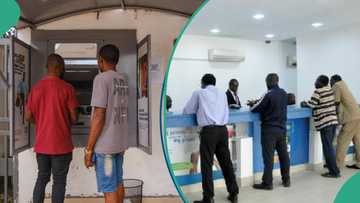Zenith, Access, GTB, Others Borrow N73.6 Trillion as CBN Announces Changes to Funding Costs
- With the apex bank's SLF, Nigerian banks were able to obtain a sizeable amount of N73.6 trillion between January and June
- Amid a difficult economic landscape, commercial banks generally rely on the SLF given by the Central Bank of Nigeria
- There is a sizable liquidity imbalance indicated by the utilisation of SLF, which is 8.4 times higher than the inflows to the SDF
Legit.ng journalist Zainab Iwayemi has over 3 years of experience covering the Economy, Technology, and Capital Market.
Afrinvest's weekly report has stated that between January 1st, 2024, and July 19th, 2024, Nigerian banks were able to access a substantial sum of N73.6 trillion through the apex bank's SLF.

Source: Getty Images
Commercial banks primarily rely on the Standard Lending Facility (SLF) provided by the Central Bank of Nigeria (CBN) in the midst of Nigeria's complex economic landscape, which is represented by the interplay of monetary policies, liquidity conditions, and market responses.
The use of SLF, which is 8.4 times greater than the inflows to the Standing Deposit Facility (SDF), indicates a significant liquidity gap that banks are finding difficult to manage, the report stated, underscoring the liquidity strains within the banking system.
In addition, the issue is made worse by the high cost of 31.75% for SLF access, which raises funding costs for banks, according to a Daily Sun report.
The asymmetric corridor was modified by the CBN's Monetary Policy Committee (MPC) from +100/-300 to +500/-100 basis points.
The report said,
“Our take is that MPC’s tinkering of the asymmetric corridor to further tighten liquidity conditions should exert pressure on funding cost for banks, both directly (as lenders tap the window) and indirectly (repricing of rates across money market)”.

Read also
GTB, Zenith, UBA, other banks announce changes in customers' loan rates after CBN’s decision
How this affects banks
The report mentioned how these measures put a heavy weight on banks and companies, even as they raise borrowing prices to lower the money supply, and consequently bring down inflation.
This pressure results from firms having to pay higher interest rates on loans, which could slow down economic growth and activity.
The report stated,
“We note that fiscal policy reforms are necessary to fix some of these issues and the monetary policy side can only do so much. Therefore, we assert that continued rate hike without complementary and decisive fiscal efforts might only increase the burden on businesses without much effect on inflation. Nonetheless, the decision to decelerate the pace of tightening indicates awareness of these underlying complexities.
Impact-wise, the increase in MPR is anticipated to cause fixed income instruments—particularly short-term assets like treasury bills and commercial papers—to reprice higher. This would inevitably draw investors' attention away from equities and toward these investments.

Read also
Expert speaks on CBN’s decision to raise interest rate by 50 basis points, asks important questions
“This trend is evident from the recent treasury bills auction, where the average stop rates across all instruments rose by 172bps to 20.0%. Additionally, we anticipate an elevated yield in the bonds market, though at a moderate pace. Conversely, pressure on interest expense and profit margins could dull outlook on corporate earnings, leading to subdued equities sentiment — other things equal”.
CBN, Dragged to Court Over 3 Major sins
Legit.ng reported that the Socio-Economic Rights and Accountability Project (SERAP) has sued the Central Bank of Nigeria (CBN) over the alleged failure to explain the whereabouts of the over N100 billion ‘dirty and bad notes'.
In a statement made available to Legit.ng on Sunday morning, July 28, SERAP said it is also taking legal action against the CBN because of the N12 billion meant for the apex bank's offices in Abeokuta, Ogun state, and Dutse in Jigawa.
Another reason why the civil society organisation is suing the CBN is the N3 billion outstanding loans granted to Anambra and Enugu states.
Proofread by Kola Muhammed, journalist and copyeditor at Legit.ng
PAY ATTENTION: Donate to Legit Charity on Patreon. Your support matters!
Source: Legit.ng




